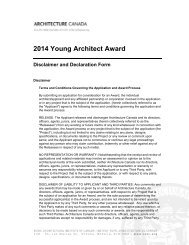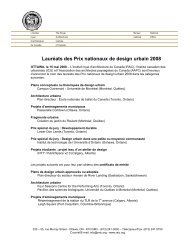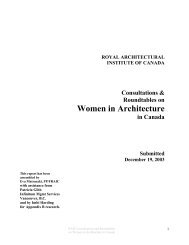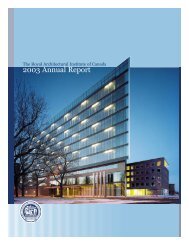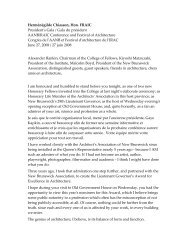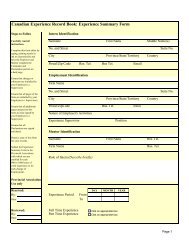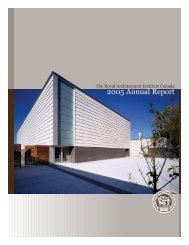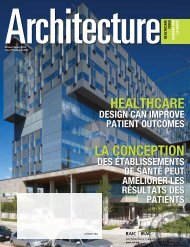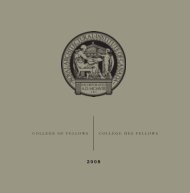Benchmark Study on Green Buildings - Royal Architectural Institute ...
Benchmark Study on Green Buildings - Royal Architectural Institute ...
Benchmark Study on Green Buildings - Royal Architectural Institute ...
Create successful ePaper yourself
Turn your PDF publications into a flip-book with our unique Google optimized e-Paper software.
initiatives proposed include accelerati<strong>on</strong> of the Biomass Town Program and the<br />
promoti<strong>on</strong> of biomass energy in Asian countries.<br />
Also in 2006, Minamata City of Kumamoto Prefecture in southern Japan announced its<br />
plans to attain a high rate of biomass resource utilizati<strong>on</strong> in the city. Aiming to become a<br />
“Biomass Town,” the city plans to use more than 92 percent of waste biomass and more<br />
than 40 percent of unused biomass, focusing <strong>on</strong> the utilizati<strong>on</strong> of wood biomass and<br />
livestock waste. The city has been collecting household waste sorted by citizens into 21<br />
categories since 1993, composting all food waste, and has achieved a 20 percent<br />
reducti<strong>on</strong> in waste volume. According to the announcement, the city plans to start<br />
biomass power generati<strong>on</strong> in fiscal 2006-07, and livestock waste treatment in fiscal 2009.<br />
Since Minamata City’s announcement, MAFF has added biomass utilizati<strong>on</strong> plans by<br />
three more municipalities -- Shikaoi Town in Hokkaido, Maniwa City in Okayama<br />
Prefecture and Yusuhara Town in Kochi Prefecture -- to its Biomass Informati<strong>on</strong><br />
Headquarters website. This website had been set up to provide a variety of informati<strong>on</strong><br />
relating to the Biomass Nipp<strong>on</strong> Strategy, Japan’s strategy for biomass utilizati<strong>on</strong>. Since<br />
2004, MAFF has been inviting municipalities to submit plans for promoting<br />
comprehensive and effective use of biomass based <strong>on</strong> this program. Shikaoi Town aims<br />
to produce and efficiently apply high-quality compost derived from waste biomass,<br />
establish systematized technologies to utilize biomass by using biogas energy, foster<br />
collaborati<strong>on</strong> between farming and stockbreeding operati<strong>on</strong>s, and create a sustainable<br />
community with fewer impacts <strong>on</strong> the natural envir<strong>on</strong>ment. Maniwa City seeks to<br />
organize a system for collecting, transforming and using waste biomass derived from<br />
wood processing, livestock manure, food waste and unmarketable lumber products. The<br />
city aims to raise its waste biomass utilizati<strong>on</strong> rate to 90 percent or more. Yusuhara Town<br />
plans to effectively use its rich wood biomass resources and establish a cyclical use<br />
system for waste biomass such as kitchen garbage, human wastes and agricultural<br />
effluent sludge. This brings the number of Japanese “Biomass Towns” to 39.<br />
METI Eco Town Program:<br />
The Eco Town Program is another METI initiative whose objective is to promote local<br />
ec<strong>on</strong>omic stimulati<strong>on</strong> through fostering envir<strong>on</strong>mental businesses that utilize the<br />
strengths of local industries, and to create resource-recycling socio-ec<strong>on</strong>omic systems by<br />
promoting local approaches for recycling and suppressing the generati<strong>on</strong> of waste. Local<br />
governments play a central role in activities under this program, by linking local citizens<br />
and industries in order to achieve innovative approaches to urban development that are<br />
envir<strong>on</strong>mentally friendly and do not duplicate existing frameworks. More specifically, a<br />
local government first creates an “Eco Town Plan” that takes advantage of the regi<strong>on</strong>'s<br />
local characteristics. Then, if the basic c<strong>on</strong>cepts and c<strong>on</strong>crete projects written into the<br />
plan are judged by METI and the Ministry of the Envir<strong>on</strong>ment as meeting a certain<br />
standard of originality and innovativeness, and judged to have the potential to serve as a<br />
model for other local governments, the two ministries jointly approve the plan. They then<br />
provide financial support for projects by local governments and private organizati<strong>on</strong>s to<br />
improve physical recycling facilities, and to implement “soft”<br />
(instituti<strong>on</strong>al/organizati<strong>on</strong>al) projects that can c<strong>on</strong>tribute to the realizati<strong>on</strong> of a recycling-<br />
93



